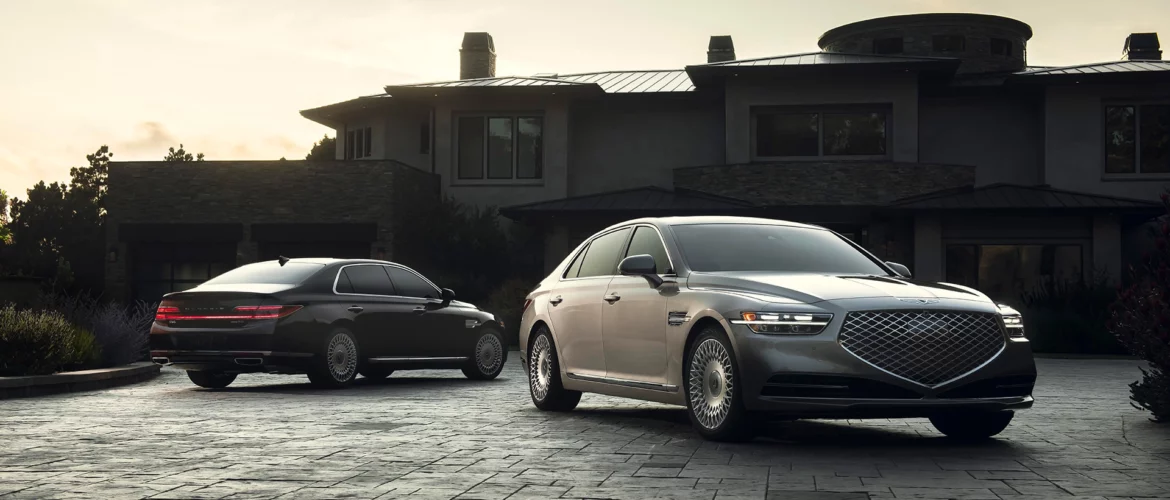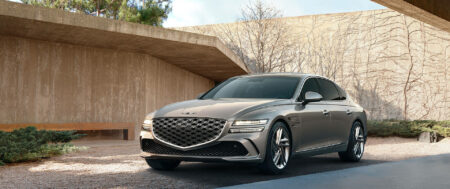Good listening, fast learning, savvy engineering, and avant-garde design allow Genesis to deliver this millennium’s LS400.
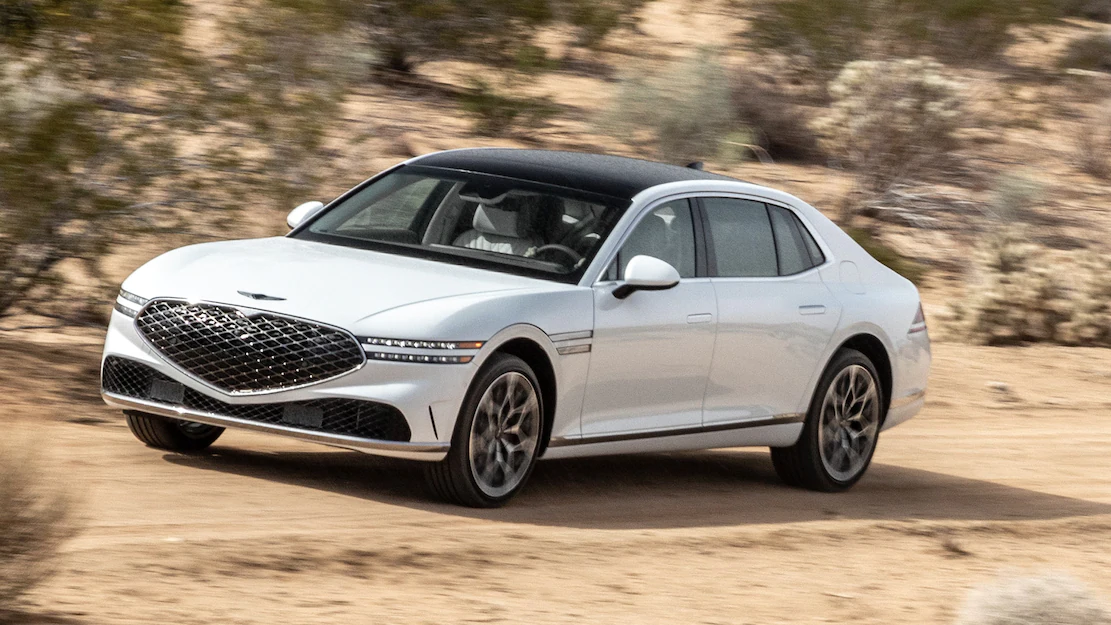
Cars are becoming a niche commodity. Once the dominant form of family transportation, the “car” as we once knew it now toes the endangered segment list. Just 11 years ago we enjoyed our biggest COTY field ever, at 35 entrants—triple the number of SUV contestants that year. Four years later, new SUVs outnumbered cars (by one), and now for 2023 they more than doubled our COTY field. And as cars get rarer, they’re also becoming rarified. The few remaining producers of mainstream econoboxes, compacts, and midsize sedans fielded no newcomers this year. In their place was a roster of mostly sporty or luxurious contestants. Among them, one outshone its own competitive set to a degree we don’t always see in our Of The Year contests: the 2023 Genesis G90.
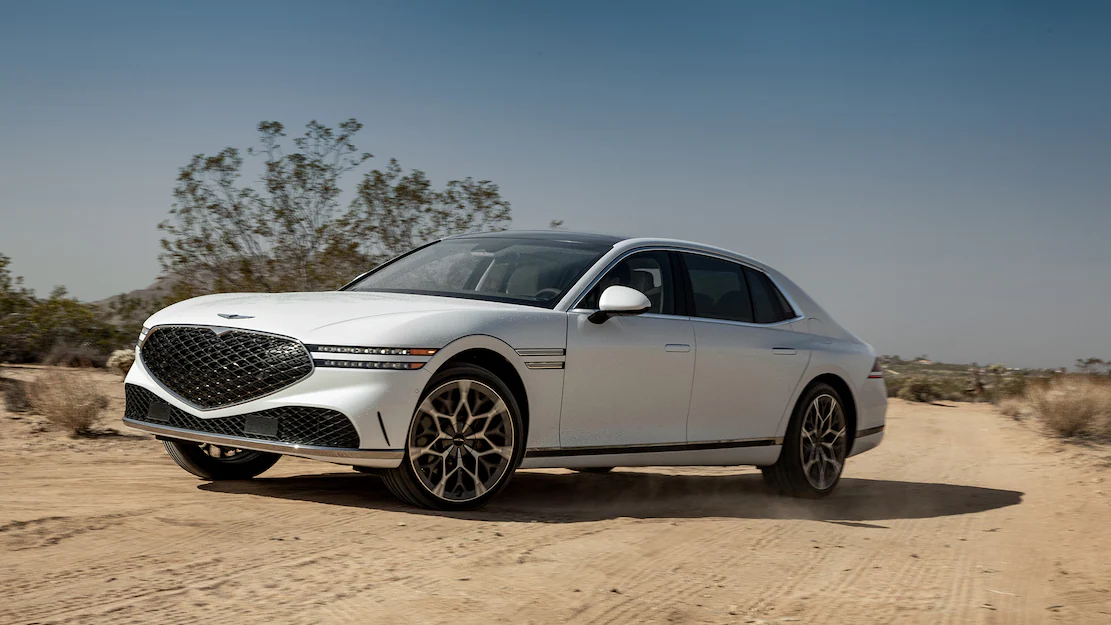
We’re gratified to see Genesis appears to read our words and act on them. Quickly. In our 2017 COTY contest, we knocked the original G90 for its conservative styling and lack of technical innovation. Just three years later we invited a “midcycle refreshed” G90 sporting bold new styling and other enhancements to our 2020 event. Then we constructively criticized its underwhelming V-8 and lack of interior innovation, concluding with: “A word of advice—a truly new G90 with the G80’s jewelry would be killer. “
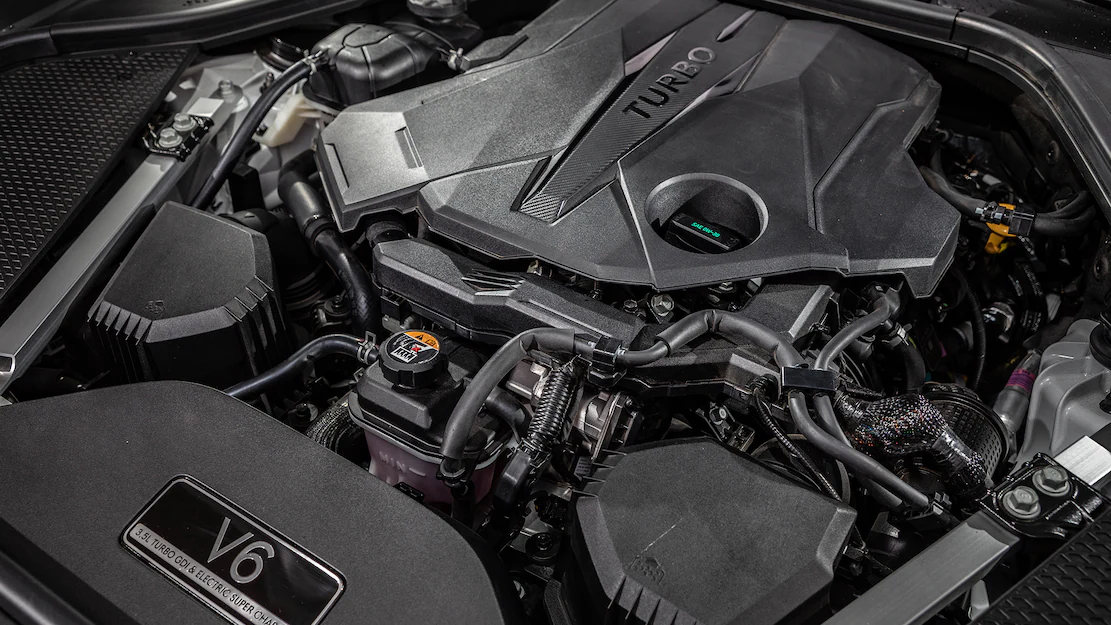
And voilà. Another three short years later, with nearly all our advice followed and criticisms addressed, the upstart luxury brand (founded November 4, 2015) sent us this completely new flagship. The 2023 Genesis G90 takes careful aim at industry stalwarts like the Mercedes-Benz S-Class, the BMW 7 Series, and the Audi A8 and very nearly strikes a bull’s-eye. This created a sense of déjà vu in our older judges, who vividly recall the similar splash made more than 30 years ago by another disruptive newcomer: the Lexus LS400. As probably happened back then, Genesis is also likely spending money, sacrificing profits, and doing the hard work required to earn a place at the ultra-luxury table.
This latest crop of Genesis vehicles—none of which can legitimately be described as a badge-engineered Hyundai or Kia—reveals an innovative brand flexing its design and engineering muscles. It no longer strives to be a fast-follower, “reverse-engineering” fads and features originated by its competitors; instead, it’s a leader in this heady space. Genesis vehicles can now sell on their own legitimate merits, not simply as bargain alternatives to the establishment benchmarks. No surprise, this ranked the G90 strongly against our Of The Year criteria.
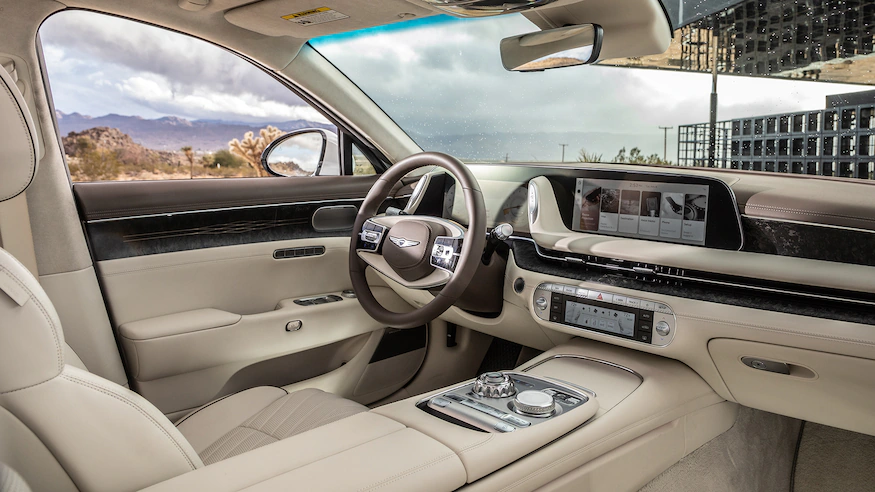
Advancement Of Design
The face-lifted first-generation G90 quite successfully grafted Genesis’ new shield-grille face and horizontal-bar lighting motif onto an existing design, making it look more contemporary and interesting. This year’s complete redesign gently refines that look while introducing a new silhouette guest judge Chris Theodore described as “a modern take on the classic formal roof that comes off quite fresh.” The simple departure from the established fastback norm caused some judges to suggest perhaps the G90 advances design more in its segment than any other contestant. “It’s elegant, formal, and timeless in a way its competitors aren’t,” features editor Christian Seabaugh said. “I think the G90 is going to age incredibly well. ”
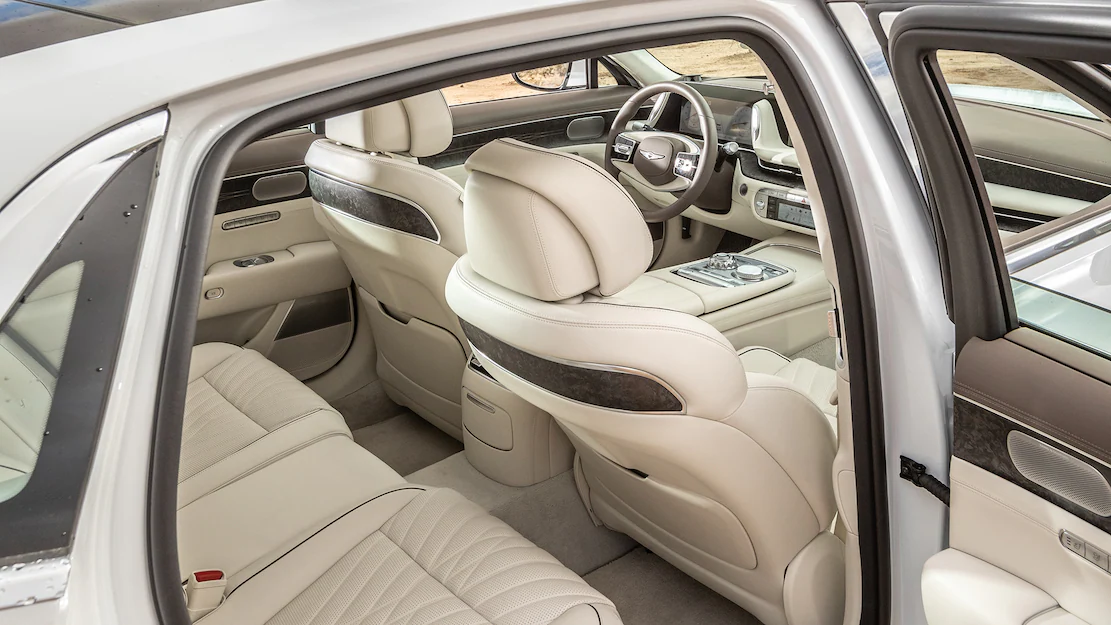
Another Genesis design innovation is the twin-bar head- and taillight design that wraps far around the sides of the car at both ends, including some of the slimmest LED rear parking light elements we’ve seen and novel front marker lights that continue aft of the front wheels. These features truly help distinguish the G90 at night, though Theodore questioned the choice of white lenses for those front markers, suggesting, “A crystal lens might be more appropriate. ”
The interior also gets a welcome makeover that’s richly appointed, intuitive to use, and welcoming. Every choice of font, feature, ergonomic control, and trim material (like crushed carbon fiber with etching on the doors) is executed brilliantly for a luxury sedan. Our judges noted the elegant jeweled rotary gearshift and dial to navigate the center screen. It’s a confident look that falls on the right side of ostentatious. You won’t find the G80’s 3D gauges, and the G90 offers no rear entertainment screens, because faking that third dimension degrades the digital instrument cluster’s resolution, and sensible rich folks know tablets are the smarter, more future-proof alternative. Buyer’s guide director Zach Gale approved of the cluster’s graphics but lamented its limited configurations. “Even Kia has better options on the Sorento,” he said. Sounds like an easy over-the-air upgrade.
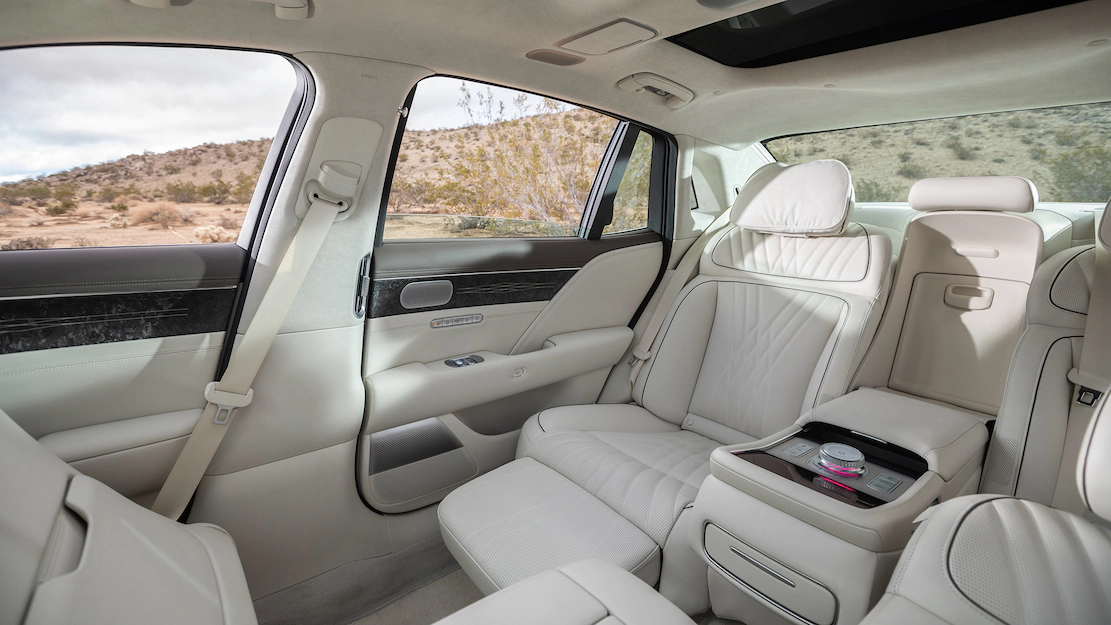
Performance Of Intended Function
This might be the Genesis G90’s strongest suit, or at least the one where it flexed its innovation muscles the most. “Genesis engineers came up with and solved problems I didn’t know I had!” deputy editor Alex Stoklosa said. Throughout the week, the nine judges kept sharing surprise-and-delight features they uncovered while exploring the G90’s settings and switches, like turn-signal noises played only in the driver’s headrest speakers so as not to disturb the passengers. Or a blue-level light adjustment for the rear seat’s comfort/audio control screen to help passengers sleep at night.
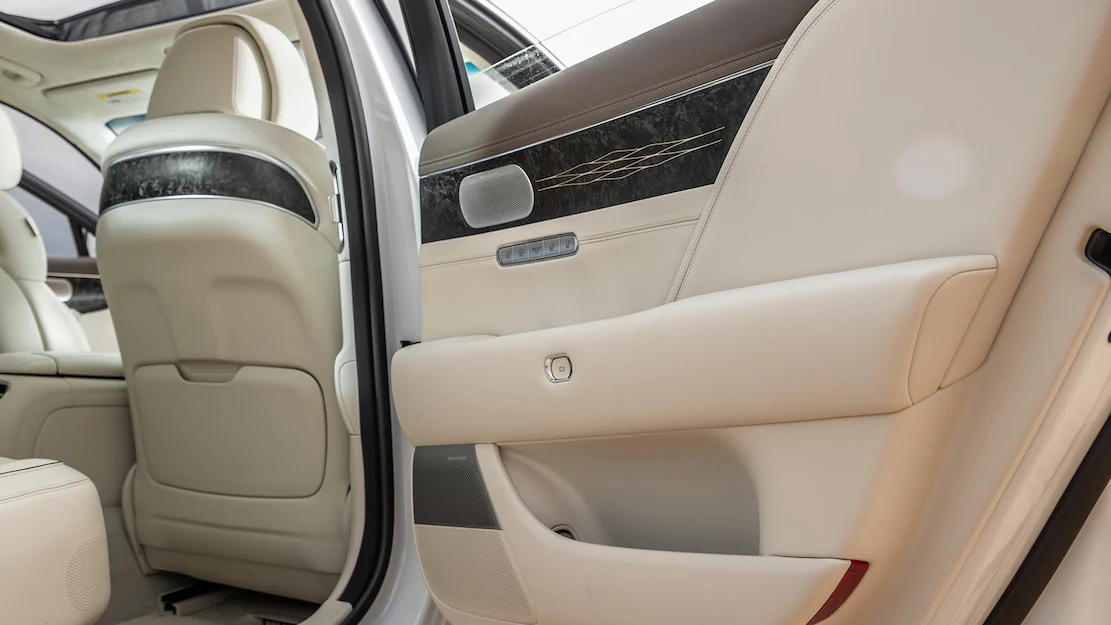
Nobody missed obvious spiffs like the power-releasing and -closing doors. Simply press a button on e-SC models, front or rear, and the doors motor shut. Like in a Rolls-Royce Phantom. And as a bonus, the redundant mechanical switch to open the doors is clearly visible in the cubby below the armrest with a light shining on it. There’s also a UV-C sterilization compartment in the rear center console.
The Bang & Olufsen sound system eschews sound-equalizer sliders in favor of a “Beosonic” tone-adjustment cursor you move along a vertical axis marked Warm to Bright and a horizontal one from Relaxed to Energetic. You can adjust surround sound or simply choose from three preset ambient environments: Boston Symphony Hall, Bang & Olufsen Home, or Reference.
The seats offer a choice of four massage programs at three intensity levels and three session lengths. Best of all: Once you’ve chosen your preferred setup, you can begin or resume it with a button on the door, saving a dive into the screen menus.
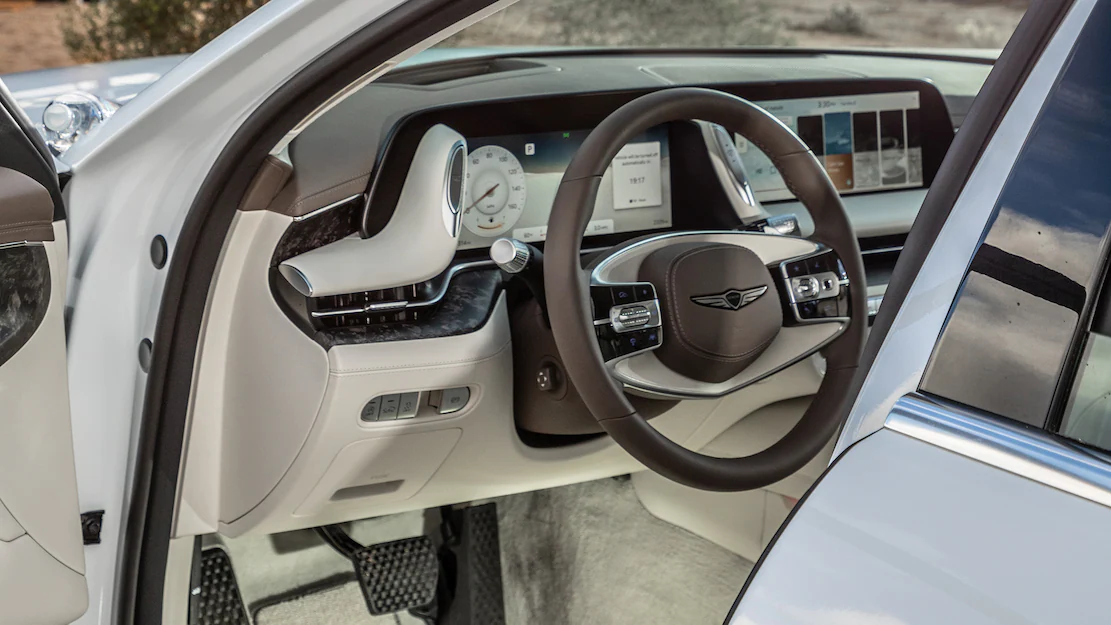
The Mood Curator offers four programs that tailor ambient lighting, HVAC, sunroof and rear-window screen positions, seat massage, sound, and scent selections to suit in a way that manages not to feel contrived or hokey. And where others offer a single scent, Genesis provides two, one that’s more vitalizing and the other more relaxing. Most judges scheduled an extended ride in the right rear seat (footrest up, front passenger seat slid forward out of the way), with the suspension set to Chauffeur mode, sampling these moods. Most came away convinced this is among the most comfortable and cosseting luxury sedans in the world. “It’s basically a spa on wheels,” said associate editor Billy Rehbock, who was nevertheless dismayed at the lack of wireless Apple CarPlay and Android Auto. (Genesis isn’t satisfied with the Bluetooth link’s reliability. )
Stoklosa noted the new luxury features “all work and enhance your experience. Therefore, nothing feels like frippery—even though it’s all frippery. “
Engineering Excellence
The above earned points in this category, but the powertrain and chassis earned their own plaudits. The base 3.5L Smartstream FR twin-turbo V-6 engine is familiar from the G80, GV70, and GV80, but an electrically supercharged version of it replaces the previous G90’s Tau V-8, trading 11 hp for 22 lb-ft more torque, which suits the luxury mission well, though some wished for more torque in enthusiastic running. It idles silently at just 500 rpm and wafts away either quietly or with a muted snarl (depending on whether Active Sound Design is set to minimize or enhance the engine note), and it drives with the sure-footedness of now-standard AWD.
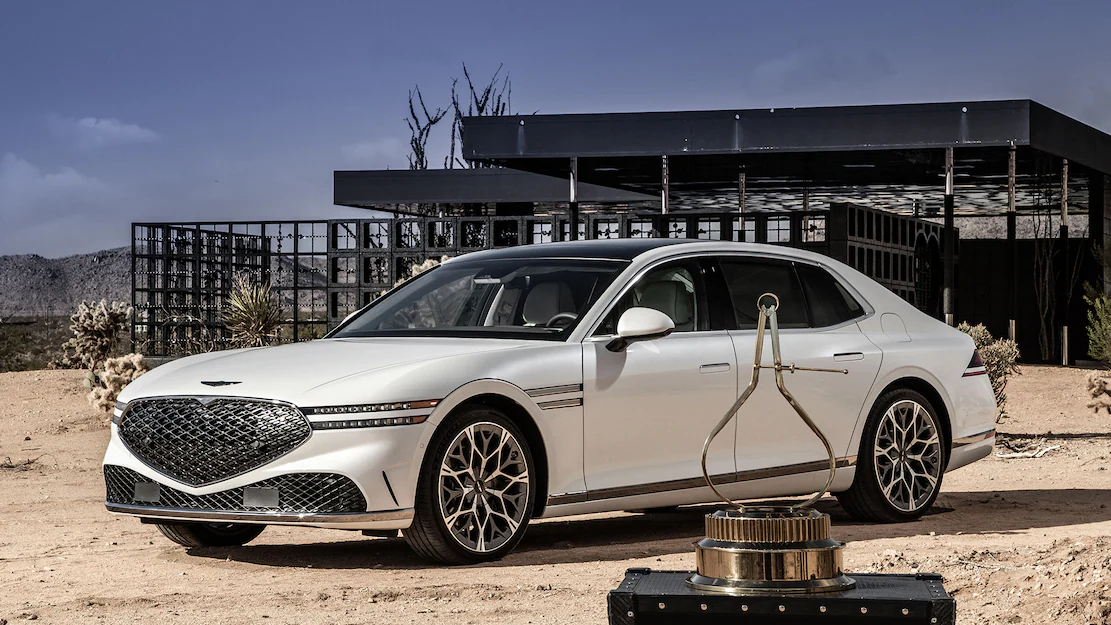
The ride quality of the top-level air suspension with adaptive damping drew high praise, especially in Chauffeur mode, which softens the rear suspension. This induces sufficient float to allow both front and rear suspensions to top out on our simulated railroad crossing at 45 mph (only the front does so in Comfort mode). Forward-facing cameras also inform the suspension of upcoming bumps and potholes, supposedly preparing them for impacts. With the car lacking any means of actively moving a wheel up and over or down into such imperfections, most judges struggled to notice or appreciate this feature, but one long-serving evaluator declared the G90 the best-riding car he’s experienced on our Car of the Year test tracks and roads.
The adaptive cruise control supports automatic lane changes and permits extended hands-off time. Best of all, the whole thing can be set at a single touch, without “running through a sequence of button presses like you’re arming a nuclear warhead,” Stoklosa said.
Clearly the engineers understood that occasionally customers with the means and inclination to own such a car may find themselves being pursued by bad people. Sport mode firms everything up just enough that, along with the added nimbleness afforded by the rear steering (standard with e-SC), the G90 comports itself rather respectably when the adrenaline’s up. It’s no Mercedes-AMG S63, however, and aggressive braking or an incipient drift will earn occupants a strong automated seat belt hug.
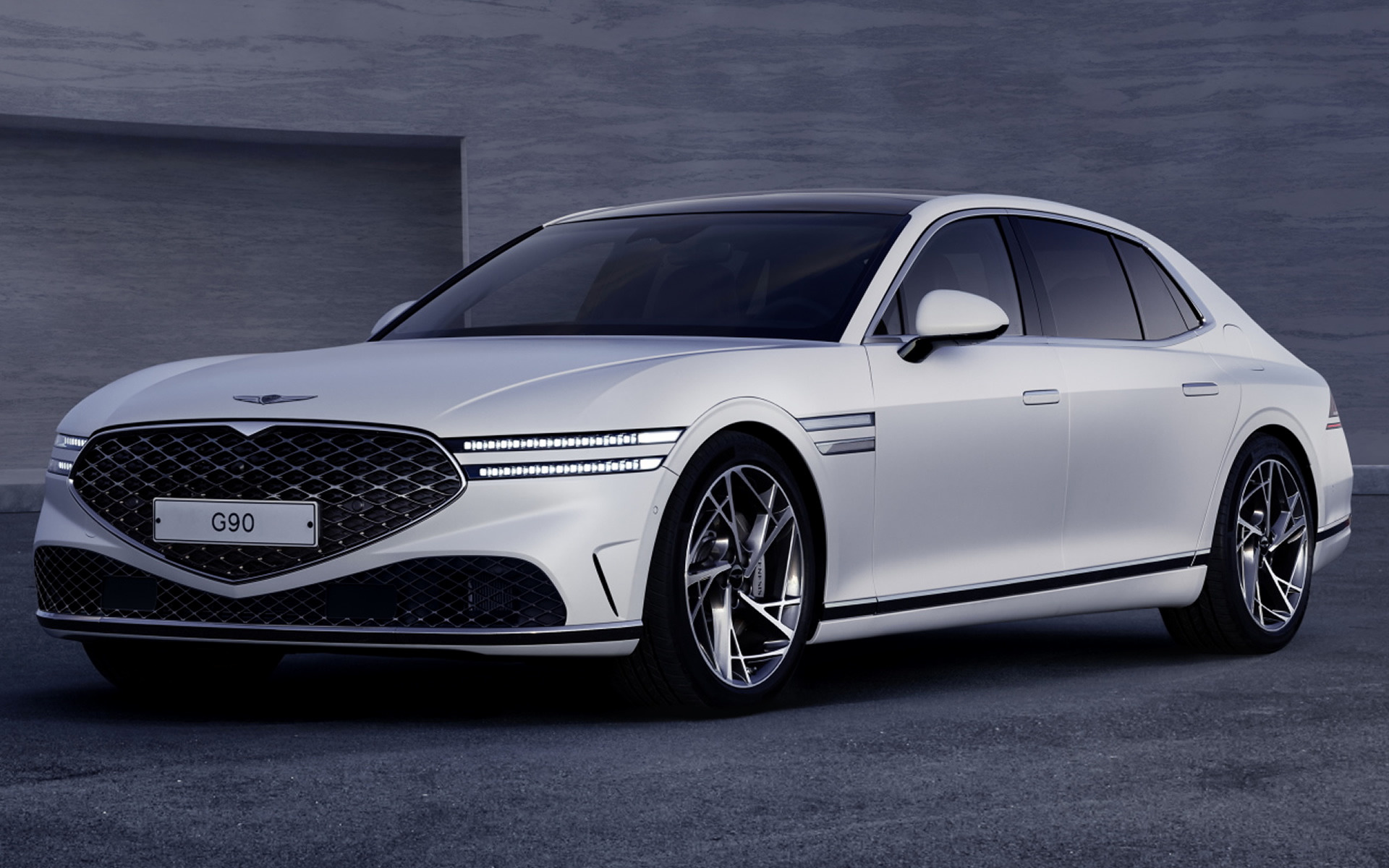
Value
Having helmed a few vehicle engineering and development programs in his day, Theodore openly questioned whether Genesis can possibly have brought this vehicle to market profitably at the prices it charges ($99,795 for the base model, $101,295 with the e-SC package). Genesis certainly wouldn’t be the first manufacturer to “buy its way into” a lucrative market by initially selling at a nominal loss. Buyers seem to be getting a product that in many ways trumps the establishment players in terms of performance, features, and luxury materials, all at a cost that undercuts them significantly. “Mercedes S-Class levels of features, comfort, and luxury at a 10 percent discount,” Seabaugh said. “For anyone turned off by Mercedes’ tech-über-alles direction, the G90 ought to be tremendously appealing.” Some wondered whether the Genesis badge and comparatively low price might put off buyers who view such things as proxies for premium. Whether for that reason or because increasing demand permits profit taking, we don’t expect the G90’s present value proposition to last long.
Safety
NHTSA has yet to test the G90, but the Insurance Institute for Highway Safety has, awarding its highest rating of Top Safety Pick+. The G90 earned the highest rating in every category but two: front crash prevention: vehicle to pedestrian (Acceptable, not Superior) and LATCH child-seat attachment ease (where it earned Acceptable instead of Good—but we don’t foresee much car-seat usage in G90s).
Efficiency
The switch from an optional V-8 to all twin-turbo V-6 propulsion delivered a slight improvement in this area: The base engine is up 1 mpg city/combined and 2 mpg highway relative to last year’s 3.3T AWD, and the e-SC improves by 1 mpg city/highway and 2 mpg combined versus the 5.0 V-8 AWD. Still, the G90 by far scores lowest in this criterion. Hyundai Group vehicles generally have higher curb weights in their respective classes, which affects efficiency. Gale noted: “17/24 mpg compares poorly to the Mercedes S500 4Matic, which is both more efficient and quicker. This is becoming a pattern for Genesis.” Then again, in the executive luxury sedan market, this is arguably the criterion that matters least to buyers.
The main thing Mercedes offers that Genesis hasn’t matched is its broad array of powertrain choices and model variants—oh, and 70 years of sales history in the U.S. But variants might not be so difficult to add: Genesis sells a longer-wheelbase model in other markets that’s a better match for Maybach models, for example.
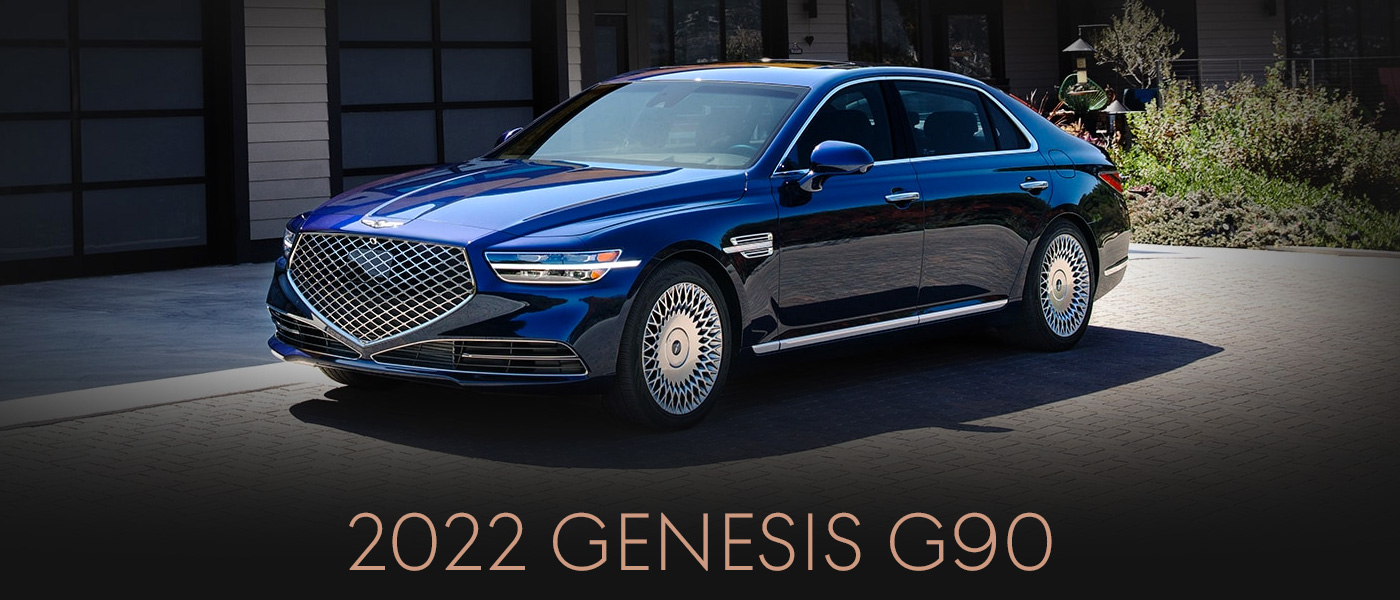
Our judges’ summations make the case for the G90 as MotorTrend’s 2023 Car of the Year: “I believe it to be the best luxury car on the market, regardless of price,” Theodore said. “Beautifully designed and crafted, it appears to have no peers.” Gale added, “It felt like $100,000—I can’t offer a higher compliment for this Genesis-badged vehicle.” Rehbock asked rhetorically, “Does this rewrite the executive limo rulebook? It does.” Finally, Stoklosa commented, “Mercedes has absolutely owned the luxury full-size sedan class for decades, so for Genesis to, on its third try, break through with something as polished, as compelling, yet somehow unique from the S-Class is stunning. Highly original yet desirable.” Our advice: Get one while the pricing’s hot.
